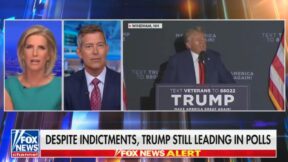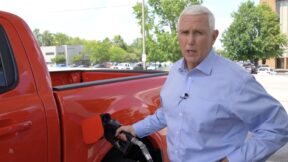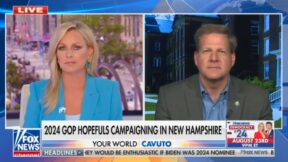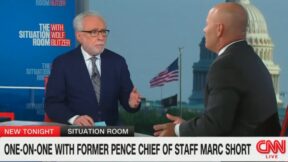6 Most Shocking Allegations From The Bombshell 45-Page Indictment of Trump Over Plot to Overturn the Election
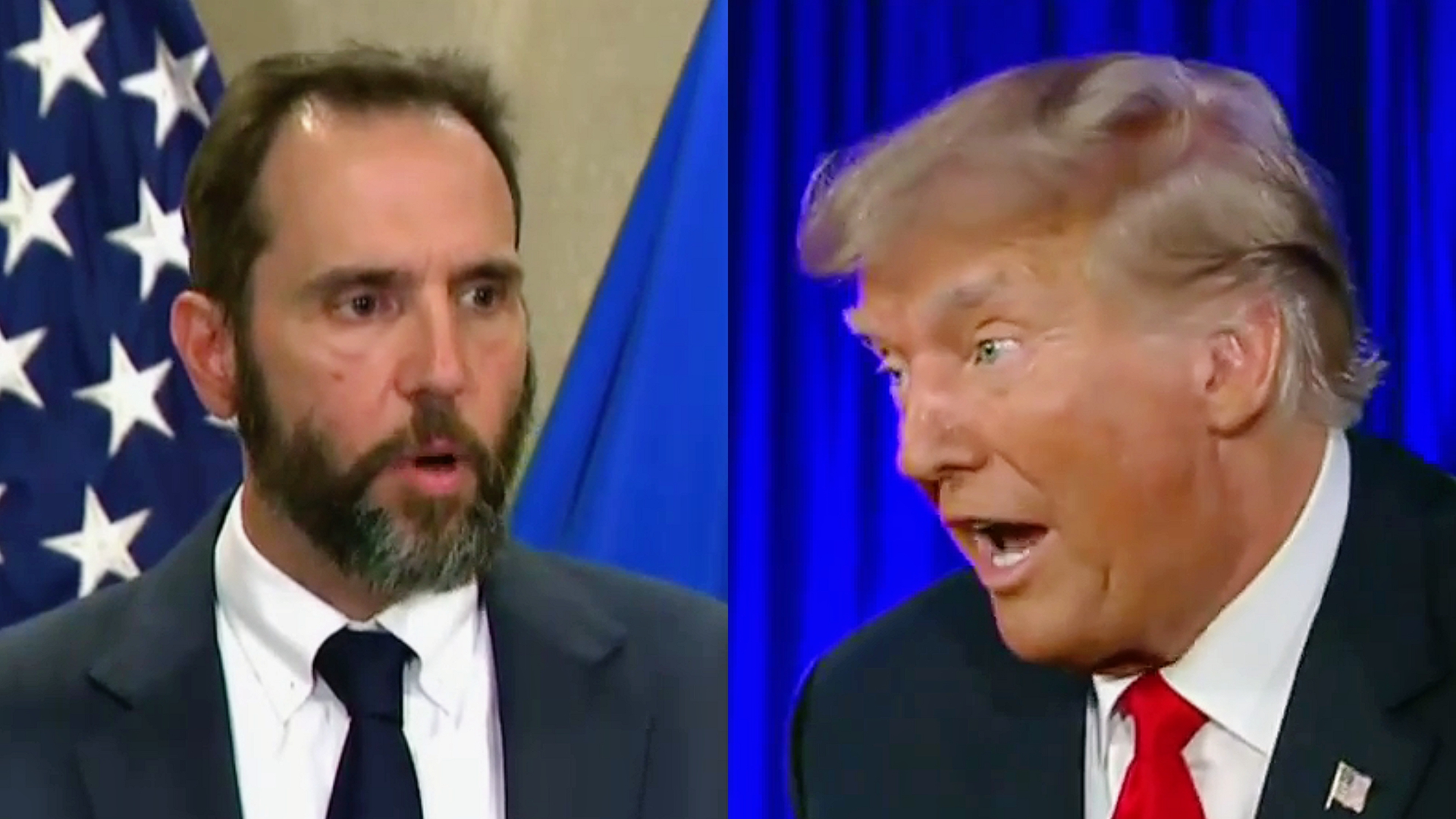
Former President Trump was indicted on four counts by a grand jury convened by special counsel Jack Smith over his efforts to overturn the 2020 election.
In a sweeping, 45-page indictment unsealed on Tuesday, prosecutors laid out in astonishing detail their allegations that Trump repeatedly pushed election officials to reject the results of the election in their states, while orchestrating a plot with several co-conspirators to fraudulently overturn the election, despite knowing their fantastical claims of election fraud were false.
Trump, the leading candidate for the Republican nomination in 2024, was charged with conspiracy to defraud the U.S., conspiracy to obstruct an official proceeding, obstruction of and attempt to obstruct an official proceeding, and conspiracy against rights.
Smith, in a press conference Tuesday night, said he would seek a “speedy trial.”
The indictment contains a series of shocking allegations and details about the plot to overturn the election, which culminated in violence on Jan. 6, 2021. See six of the most shocking below.
Trump knew
There has been an odd debate over the years — as the stolen election claims were beaten down by Trump-appointed judges and his own campaign and reality — over whether Trump knew his claims were false.
To this day, Trump maintains the election he lost by millions of votes to President Joe Biden was stolen from him. He has enough toadies in conservative media supporting that lie.
Now, the indictment maintains that Trump knew those claims were false — and engaged in an illegal plot to act on them and remain in power.
Per the indictment:
The Defendant, DONALD J. TRUMP, was the forty-fifth President of the United States and a candidate for re-election in 2020. The Defendant lost the 2020 presidential election. 2. Despite having lost, the Defendant was determined to remain in power. So for more than two months following election day on November 3, 2020, the Defendant spread lies that there had been outcome-determinative fraud in the election and that he had actually won. These claims were false, and the Defendant knew that they were false. But the Defendant repeated and widely disseminated them anyway — to make his knowingly false claims appear legitimate, create an intense national atmosphere of distrust and anger, and erode public faith in the administration of the election.
The indictment also lists those who told Trump his false election fraud claims were indeed untrue, including Vice President Mike Pence, senior leaders of the Justice Department, the Director of National Intelligence, the Department of Homeland Security’s Cybersecurity and Infrastructure Security Agency, senior White House attorneys, senior staffers on Trump’s 2020 campaign, state legislators and officials, and state and federal courts.
Trump orchestrated the fake electors plot
The indictment accused Trump and his co-conspirators of being behind a plan to get fraudulent slates of electors in seven states he lost to certify in his favor.
In December 2020, Trump tried to put out a statement on the fake electors plot, but senior staffers in his campaign refused to put their names on it, calling the plan “crazy.”
Trump also pressured Pence, according to the indictment, to reject the legitimate electors in the seven states he lost. Pence took contemporaneous notes of their meeting.
In Michigan, 16 of those fake electors were just charged with felony election law and forgery crimes.
The co-conspirators
While Trump’s co-conspirators are not named in the indictment, number 1 is clearly Rudy Giuliani, one of the more deranged proponents of the stolen election theory. The tell is a section that describes co-conspirator 1 as accusing two election workers of stealing votes — which Giuliani infamously did:
26. On December 10, four days before Biden’s validly ascertained electors were scheduled to cast votes and send them to Congress, Co-Conspirator 1 appeared at a hearing before the Georgia House of Representatives’ Government Affairs Committee. Co-Conspirator 1 played the State Farm Arena video again, and falsely claimed that it showed “voter fraud right in front of people’s eyes” and was “the tip of the iceberg.” Then, he cited two election workers by name, baselessly accused them of “quite obviously surreptitiously passing around USB ports as if they are vials of heroin or cocaine,” and suggested that they were criminals whose “places of work, their homes, should have been searched for evidence of ballots, for evidence of USB ports, for evidence of voter fraud.” Thereafter, the two election workers received numerous death threats. 27. On December 15, the Defendant summoned the incoming Acting Attorney General, the incoming Acting Deputy Attorney General, and others to the Oval Office to discuss allegations of election fraud. During the meeting, the Justice Department officials specifically refuted the Defendant’s claims about State Farm Arena, explaining to him that the activity shown on the tape Co-Conspirator 1 had used was “benign.”
As for the other co-conspirators, they are:
2- John Eastman
3- Sidney Powell
4- Jeffrey Clark
5- Ken Chesebro
6- Unknown political consultant
Trump told Pence ‘you’re too honest’
Trump repeatedly insisted, in the run-up to Jan. 6, that Pence had the power to reject the results of the election. Pence pushed back on Trump each time, explaining (correctly) that he had no power to overturn the election. Pence even pointed out that Trump’s own White House lawyer confirmed he did not have the power to unilaterally declare the winner of the election, but Trump ignored him.
During one call in which Trump tried to pressure Pence to go along with the plot, he told his vice president: “You’re too honest.”
A Trump co-conspirator proposed using the military to remain in power
In one particularly alarming scene spelled out in the indictment, Jeffrey Clark, who Trump wanted to name acting attorney general because of his willingness to go along with the attempt to overturn the election, discussed the consequences of denying Biden’s win with a White House lawyer.
When the lawyer said there would be riots in the streets if Trump effectively attempted a coup, Clark replied that any unrest could be quelled by the Insurrection Act — which allows the president to use the military to shut down rebellions.
81. On the afternoon of January 3, Co-Conspirator 4 spoke with a Deputy White House Counsel. The previous month, the Deputy White House Counsel had informed the Defendant that “there is no world, there is no option in which you do not leave the White House [o]n January 20th.” Now, the same Deputy White House Counsel tried to dissuade Co-Conspirator 4 from assuming the role of Acting Attorney General. The Deputy White House Counsel reiterated to Co-Conspirator 4 that there had not been outcome-determinative fraud in the election and that if the Defendant remained in office nonetheless, there would be “riots in every major city in the United States.” Co-Conspirator 4 responded, “Well, [Deputy White House Counsel], that’s why there’s an Insurrection Act.”
Trump pushed plot DURING Jan. 6 violence
The indictment alleges that Trump “exploited” the attack on the Capitol by a mob of his supporters to push the plot to overturn the election.
Prosecutors proceed to lay out in detail how Trump and his co-conspirators, watching the violence unfold on television, continued to push for the election to be certified in his favor.
Read the full indictment here.
Have a tip we should know? tips@mediaite.com
